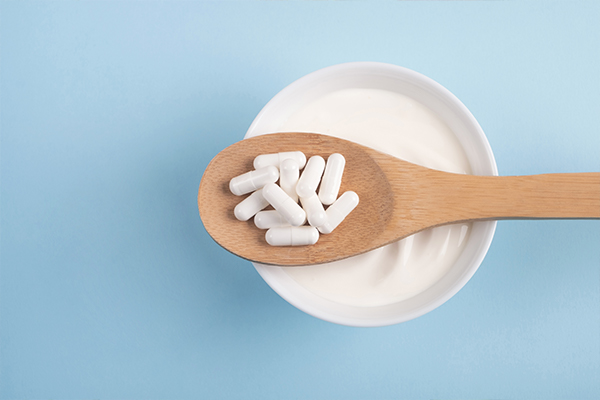Chances are, you’ve heard the word “probiotics” advertised on supplements or mentioned online when talking about digestive health. But what are probiotics, exactly? And how do you get them? Are supplements really necessary?
Probiotics play a crucial role in our health and you don’t have to take supplements to get them. They occur naturally in fermented products, like Yoso’s range of vegan probiotic yogurts.
In this article, we will answer all your questions about probiotics. Let’s get started.
What are Probiotics?
Probiotics are live, beneficial bacteria and yeasts that live in your body. These microorganisms are essential for good health, so they’re often called “good bacteria.”
Every person’s body contains a combination of good bacteria and bad bacteria. The good bacteria keep the bad bacteria in check, while also helping with digestion and your body’s overall health.
These bacteria, along with fungi, viruses, and protozoa, make up your body’s microbiome. Your microbiome is 100% unique to you.
Although probiotics live naturally within your body, they are also consumed through fermented foods (like Yoso Plant-Based Yogurt).
There are many types of probiotic bacteria; however, they all share a few characteristics. They are separate from the human body, can survive in your intestine after ingestion, and are safe to consume.
The most common types of probiotic bacteria are:
-
Lactobacillus
-
Bifidobacterium
-
Saccharomyces boulardii
5 Health Benefits of Probiotics
1. Balance Your Gut Microbiome
Your gut microbiome includes all the live microorganisms that exist in the body naturally. When the microbiome is balanced and healthy, your digestive system works as it should.
Healthy microbiomes have a balance of good bacteria and bad bacteria. If there are too much bad bacteria and not enough good bacteria to fight them off, your gut is imbalanced.
This can lead to health complications such as digestive issues, allergies, and mental health problems.
Probiotics are good bacteria. When you consume foods or supplements that contain probiotics, you are adding to the number of good bacteria in your digestive system. This helps restore the natural balance of gut bacteria, which leads to a variety of health benefits.
2. Improve Digestive Health
Probiotics have been shown to help reduce the symptoms of certain digestive disorders, in addition to helping your body digest food.
Scientists are still learning how probiotics can help with a variety of medical conditions. So far, probiotics have been shown to reduce the symptoms of bowel disorders like IBS, IBD, and ulcerative colitis. They can also help treat infectious diarrhea.
Consuming probiotic-rich foods helps restore the gut microbiome after taking antibiotics. Antibiotics make you feel better, but they destroy the good and bad bacteria in the process.
Additionally, probiotics can help reduce the risk of other health conditions, such as urinary tract infections in women.
3. Promote Heart Health
You’ve probably heard of “good” and “bad” cholesterol. High levels of bad or LDL cholesterol significantly increase your risk of developing heart disease. Probiotics help maintain healthy cholesterol levels, which keeps your heart healthy. They lower LDL cholesterol while also promoting the production of good HDL cholesterol.
Additionally, probiotics can help lower blood pressure. This is more good news for your heart!
4. Reduce Allergies and Eczema
Some research suggests that probiotics (specifically Lactobacillus) can reduce the severity of some allergies and eczema. Probiotics can strengthen the immune system, which then helps your body combat inflammation.
5. Improve Mental Health
Researchers are uncovering the connection between gut health and mental health. Some studies have shown that increasing your consumption of probiotics can help to relieve symptoms of depression and anxiety.
7 Examples of Vegan Probiotic Foods
1. Vegan Probiotic Yogurt
Vegan yogurt, like Yoso’s range of Plant Based Yogurts, is a great source of healthy probiotics.
Like dairy yogurt, it’s made using a fermentation process. Fermentation is essential for that creamy consistency and the abundance of good bacteria. Coconut, soy, tree nut, or oat milk is used instead of cow milk.
At Yoso, we ferment our yogurts using a dairy-free bacterial culture. Our Oat Plant-Based Yogurt contains 1 billion live active probiotic cultures per serving.
It’s important to always choose a plant-based yogurt with a live, active bacterial culture. If the bacteria have been killed during processing, you will not get any health benefits.
2. Kombucha
Kombucha is a fermented tea drink that has become incredibly popular in recent years. As with yogurt, it’s essential to choose a kombucha that has a live bacterial culture. Otherwise, it’s just a tasty drink!
Many brands of kombucha do not contain live microorganisms, which means you will not get any of the probiotic benefits. Consequently, always check the label and do your research.
3. Sauerkraut
Sauerkraut is finely shredded, fermented cabbage that originates from Eastern Europe. It’s one of the oldest forms of fermented food. Besides containing high levels of probiotics, sauerkraut is also rich in vitamins, minerals, and antioxidants.
Again, make sure to read the label before purchasing sauerkraut from the grocery store. If you want probiotics, you need to choose an unpasteurized sauerkraut. Pasteurizations kill beneficial microorganisms.
4. Tempeh
Tempeh is a fermented tofu. It’s a traditional Indonesian food that has gained global popularity thanks to its high protein content.
However, tempeh isn’t just a great source of plant-based protein. It’s also full of healthy probiotics!
Additionally, the fermentation process creates vitamin B12. This vitamin is essential to good health but difficult to get while eating plant-based. Vegans should always supplement with vitamin B12- even if they do eat a lot of tempeh.
5. Miso
Miso is another fermented soybean product, this time hailing from Japan. It’s the foundational ingredient in the popular Japanese dish, miso soup. This salty, scrumptious paste is rich in probiotics, protein, fibre, and various vitamins and minerals.
6. Pickles
Pickles (or gherkins) are cucumbers that have been fermented in salty water. This process leads to an abundance of healthy probiotic bacteria. However, pickles fermented in vinegar do not contain probiotics.
7. Bacillus
There is also a new type of soil-based probiotic strain called Bacillus. Naturally found in the earth, bacillus can withstand harsh environments, making it perfect for surviving in our stomachs.
Therefore, it has a greater potential to set up home in our gut and re-balance our microbiome.
Vegan Probiotic Yogurt by Yoso
Probiotics are vital for our health. Without these beneficial good bacteria, our gut microbiome becomes imbalanced, and our health suffers. You might find yourself at risk for digestive issues, high cholesterol, and poor mental health.
By eating foods that are rich in probiotics, you are taking steps to secure a healthy future.
Yoso vegan probiotic yogurt contains a dairy-free live bacterial culture to positively support your microbiome. Our delicious, creamy, and nutritious range of plant-based yogurts are part of your healthy lifestyle.
To learn more about vegan probiotic yogurts from Yoso, visit us at yoso.ca or contact us here.

